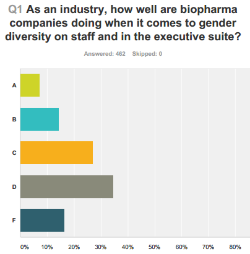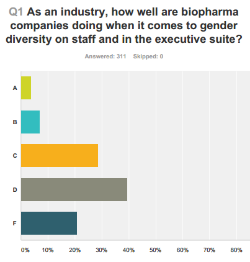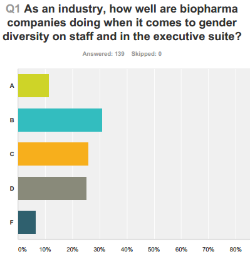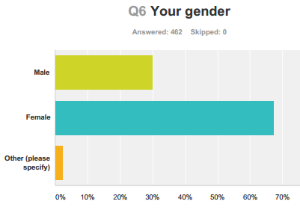 |
| More than half of poll responders gave biopharma a D or F for its efforts in gender diversity. (Click image to expand.) |
The biopharma industry doesn't do a very good job when it comes down to the way it handles gender diversity. And if you're a woman in this business, chances are you have a distinctly bleaker view of things than your male colleagues, especially as you compare rank-and-file staffers with those who make it to the top.
That's the bottom line from last week's informal survey from FierceBiotech, which was inspired by a widespread backlash in the industry against the way a couple of firms--specifically LifeSci Advisors, which apologized, and Roth Capital, which steadfastly refuses to--have recruited models and female dancers to adorn their events. Hundreds of prominent industry execs signed off on the protest, looking for an end to gatherings that create a boys' club environment for the men and a hostile landscape for many women.
Gender diversity in the industry, though, clearly remains a sore point for a large number of men and women. When it comes down to how well companies are operating on that score, seeking out and promoting the best women, the best and brightest execs in biopharma--where graduate degrees are commonplace--would typically find themselves with barely a passing grade.
 |
| Female respondents were more likely to give the industry a negative grade. (Click image to expand.) |
Altogether, 462 men and women answered the survey, which leaned heavily toward women, who made up two thirds of the total audience. Slightly more than half assigned only a D or an F to biopharma, with D attracting the single largest vote. Only 7.3% felt the experience was worth an A, with 14.5% coming in with a B and 27% registering a mediocre C grade.
The perspective between men and women, though, was distinctly divergent, with women more likely to assign a D or F to the industry and men skewing toward a B or a C.
Of the 311 women taking the survey, 60% assigned a D or failing grade to biopharma. Only 3.9% felt the industry warranted an A grade, 7% came in with a B, and 28% settled on a C, with a number seeing that grade as a reflection of an improvement over the last few years.
Among the 139 men in the industry who completed the survey, the largest group--31%--settled on a B, with 26% handing out a C, 25% issuing a D, 11.5% registering an A and 6.5% rating it an F. That wasn't stellar by any means, but it was distinctly more upbeat than the female view of the current scene.
Here's a look at a few of the grades and comments we received.
 |
| The largest group of male respondents gave biopharma a B. (Click image to expand.) |
F -- Mette Kirstine Agger, managing partner at Lundbeckfond Ventures: "Despite (a) highly talented female pool and continuously higher number of females to males graduating from universities, the climb to the top remains difficult; perhaps because recruitment of talent continues to focus on like-minded and well-known players."
D -- Anna Protopapas, CEO, Mersana: "The industry is 50% at the entry level (much better starting point than other industries) but the ranks thin out significantly as you go up. Pretty disappointing for an industry full of very highly educated people."
F -- Maxine Gowen, CEO, Trevena: "You have all the statistics. Personal experience: I am on the board of two public biotech companies, the only woman on one and one of two on another. My board frequently is the subject of remarks from investors and bankers along the lines of 'you have an amazing board,' 'this is the board of a large cap company not a SMID cap' (which we are). My board has 50% women. When I asked my (very prominent) recruiter to find me women board members and made it easy for him by asking for a list of only women, he brought me a long list of 50s white males (all good characteristics but not my target) and two women."
C -- Deborah Dunsire, CEO, Forum Pharmaceuticals: "We have a significant number of women at the VP level and more at the SVP level than we have in the past. We lag at the C Suite as an industry--not as bad as Wall St or the Fortune companies but still not where we should be given the number of highly skilled and qualified women in our companies. Gender diversity on Biotech boards still lags. Gender is not the only area of diversity lacking. Ethnic/racial diversity at leadership levels is also sadly lacking."
 |
| The majority of respondents identified as female. (Click image to expand.) |
C -- Julia Owens, CEO, Millendo: "Some progress being made, as evidenced by the reaction to your coverage on the issue, but it's still moving too slow, especially at the senior management and board level. As a female CEO (with a 60% female board and majority female employee company), I almost never feel blatantly discriminated against, but I am in a clear minority when I am at investor conferences in weeks like this. I'm glad to see the discussion continuing and hope it translates into change."
A -- Ann Young, staff scientist, Pfizer: "I have noticed, over the last decade, a rapidly increasing number of women in staff positions and in the executive suite. Bravo Big Pharma!"
Among men, there was widespread acknowledgement that there are plenty of problems, but a greater likelihood to see the glass more half full than half empty, especially when compared to other industries.
B -- Art Krieg, CEO of Checkmate: "My first thought was to give biotech a C or even D, but relative to other industries, like tech, I think we look very good. In my experience gender diversity at the scientist level is excellent, but at director level and above there is a clear imbalance that increases as you go higher, with a few exceptions, like HR. There are VERY few female CSO or CTO, perhaps even fewer than the more visible CEO role. But I am surprised that your question focuses on the biotech companies, whereas the 'offenders' that led to the firestorm were advisors/investors. In my experience there is even less gender diversity in the top ranks of that area than there is in the biotech/pharma companies!"
D -- Thomas Helleday, scientist, Karolinska Institutet: He notes that you'll generally find men in the leading positions in the industry.
B -- Roger Tung, CEO, Concert Pharma: "Increasing gender representation over time. Our COO and about half of senior staff are women--very different from a few decades back. We have a goal of increasing diversity, including gender diversity, at the board level as well."
B -- John Edwards, executive chairman, F-Star, ImmuneXcite: "The numbers would get the grade of a C in the staff and a D in the executive suite, but I have never even once seen any suggestion of bias against hiring or promoting a person based on gender."
I received several queries from women who asked if they could respond anonymously. For many, they didn't want to be seen criticizing their own company, and the men who run them. But they felt it keenly. "I am a little concerned about political ramifications for being quoted directly," noted one woman. Not surprisingly, she graded the industry low. -- John Carroll (email | Twitter)